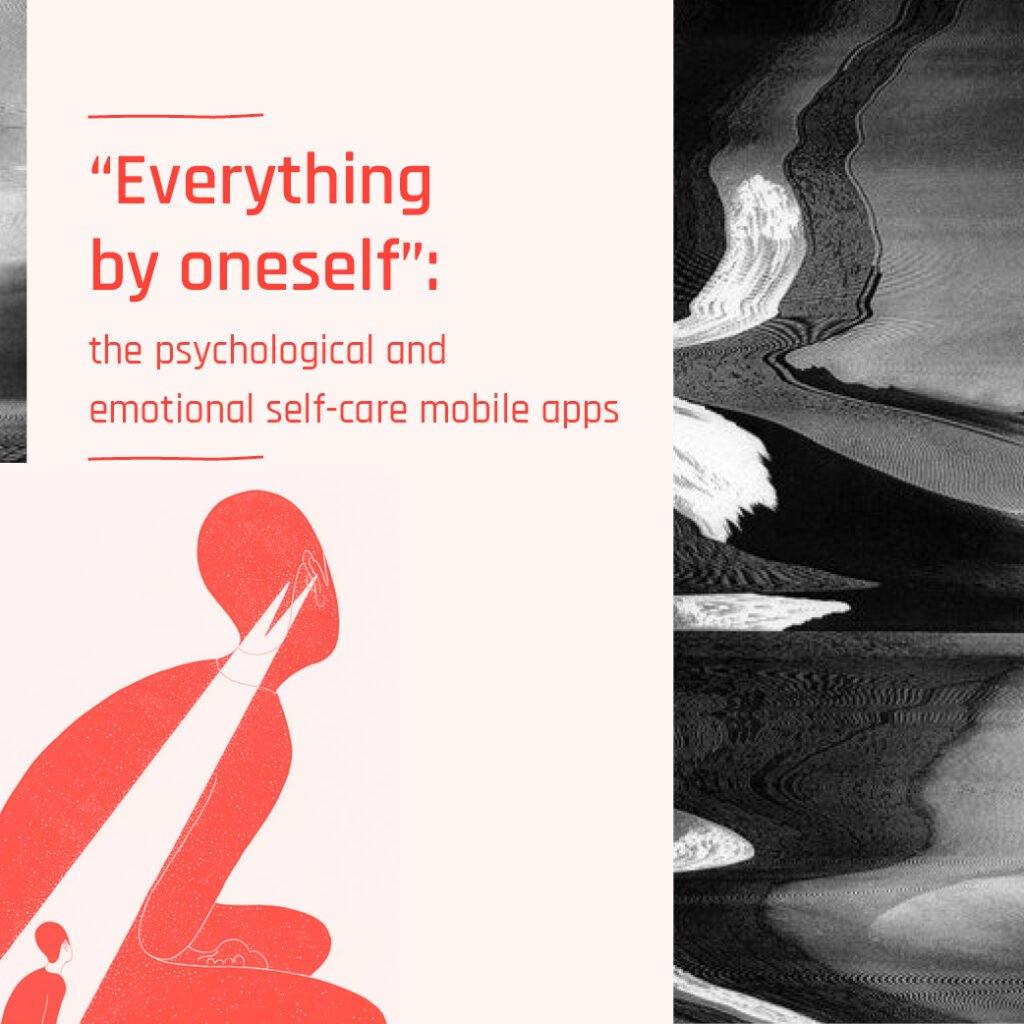Report // “Everything by oneself”: the psychological and emotional self-care mobile apps
3 de March de 2021
The new coronavirus pandemic summons us to inhabit an extremely uncertain and unknown corporal and subjective zone. The epidemiological measures try to delimit boundaries that keep the bodies less exposed to the risk of contagion, fixing isolation, distances, and endless hygiene rituals. These same rules, added to the asphyxiating context of the pandemic, afflict and weaken subjectivities. The World Health Organization (WHO) warned, in March 2020, that public mental health was an issue that deserved attention, and that the main psychological impact of the pandemic would be increased levels of anxiety and stress. It’s exactly what we are seen now, almost a year later.
At the same time that physical contact decreased, we have been experiencing the intensification of our connected lives mediated by digital technologies. A survey reported that in Brazil, health and fitness apps saw a 226% increase in non-organic (ad-driven) installs and a 116% increase in organic (no ad targeting) installs in a period of just 12 days (between March 14 and March 26, 2020). After a few weeks with steady growth, paid ad-driven (non-organic) installs saw a nearly 20% jump between April 20 and April 27. The concern grows when we note that this category (health and fitness) includes mental health apps, which had already been growing significantly in the global digital health market, with now over 10,000 apps claiming to reduce anxiety and stress, improve sleep, mood, etc.
When the pandemic was officially declared by WHO on March 11, 2020, we were finishing, at MediaLab.UFRJ, a partial report on psychological and emotional self-care apps in Brazil. Suddenly, not only our personal and academic lives were completely changed, but the object of our report gained a new relevance. Six of the ten apps analyzed in our study are part of the “Health and Fitness” category, with a significant increase in downloads since the pandemic was declared. Questions that were already present re-emerge with greater force: what kind of data is captured, shared, and generated by such apps? Where is the line between the emotional comfort they offer and the risks they expose us to? What are the clinical basis and reliability of the services offered by these apps?
In a context of exception and extreme vulnerability, attention to the practices of self-care and care for others is fundamental. Equally important is the difficult balance between the agility of responses in a context of urgency and the need to discuss and carefully evaluate the ‘solutions’ offered. In the field of mental health in Brazil, groups of therapists have organized themselves to offer free services mediated by videoconference tools, such as the Psychological Support Network, created to assist frontline health professionals. Institutions such as the Oswaldo Cruz Foundation (Fiocruz) and the WHO itself have released primers and courses pointing out guidelines for distance treatment during the Covid-19 pandemic. Psychoanalytic institutions offer online services, some of them free of charge. Citizen solidarity and listening networks are created to share learning, reliable information, and initiatives in the context of the pandemic, seeking to alleviate various types of suffering linked to isolation. While these initiatives are generally mediated by institutions with solid experience in the mental health field or by voluntary citizen initiatives that are clearly non-commercial and transparent as to their purposes and operation, the psychological and emotional self-care apps we analyze operate in a nebulous zone that mixes technological innovation, commercial interests, and psychological and emotional support. This implies that their actions and effects have imprecise boundaries, with several ethical, legal, and epistemological loopholes, as we will see in the REPORT “Everything by oneself”: the psychological and emotional self-care mobile apps, which we release the english version today.
The report is part of the research Psychic Economy of Algorithms: rationality, subjectivity and conduct in digital platforms, coordinated by Prof. Fernanda Bruno developed together with the team from MediaLab.UFRJ, in partnership with LAVITS Network. It brings preliminary results of the analyses of 10 free apps for psychological and emotional self-care used in Brazil, available in the Google App Store. The apps were selected from an initial universe of 350 search results carried out in the App Annie platform, according to criteria of relevance and popularity. The analysis unfolded in two axes. The first was dedicated to a more visible layer of the apps, specifically to the discourse of presentation and description of the apps and their features in the app store, on their websites and social networks. The second axis focused on a more opaque layer, aiming to map the ways of collecting, using, and sharing information from the users of these apps. We highlight, in the first approach, that part of the applications are aimed at an “anxious subject”, to whom they offer the means to take care of oneself, especially by means of self-monitoring and self-knowledge. In the apps’ discourse and tools, psychic and emotional suffering, as well as the proposed therapy, are strongly centred on the individual. In the second axis, we emphasize the lack of transparency and clarity regarding the type of data that these apps collect from users, as well as the trajectory of these data both in the sharing with third parties and in their purposes and uses. From the visualization of the trackers present in the apps and a brief analysis of their terms of use and privacy, we present a few insights about the nature of the data ecosystem and predominant business models.
.
See more about the “Psychic Economy of Algorithms:
BRUNO, Fernanda. A economia psíquica dos algoritmos: quando o laboratório é o mundo. Jornal NEXO, 12 de junho de 2018. Disponível em: <https://www.nexojornal.com.br/ensaio/2018/A-economia-ps%C3%ADquica-dos-algoritmos-quando-o-laborat%C3%B3rio-%C3%A9-o-mundo>
BRUNO, Fernanda; BENTES, Anna; FALTAY, Paulo. Economia psíquica dos algoritmos e laboratório de plataforma: mercado, ciência e modulação do comportamento. Revista Famecos, Porto Alegre, v. 26, nº 3, set-dez, 2019. Disponível em: <http://revistaseletronicas.pucrs.br/ojs/index.php/revistafamecos/article/view/33095 >
